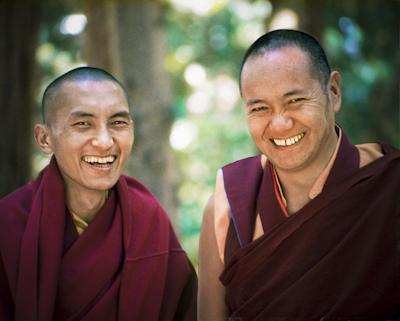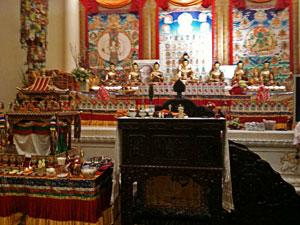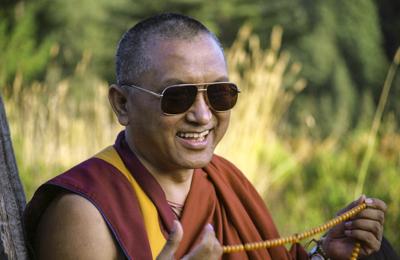E-letter No. 81: February 2010

Dear LYWA friends and supporters,
Thank you for your interest in our monthly e-letter. Please pass it on!
Earlier this week Jen sent a message about some problems with our website. The good news is that we are back online and none the worse for the wear. Thank you for your prayers and good thoughts.
Singapore Update
I’m writing to you from Singapore, where I’ve just attended some amazing teachings by Lama Zopa Rinpoche on the Lama Tsongkhapa Guru Yoga.
I’m also here on LYWA business and will be going to Malaysia for a few days this weekend. Back in Boston March 5.

FPMT’s Amitabha Buddhist Centre here in Singapore is beautiful...completed about four years ago it’s a seven-story building packed with holy objects and eager Dharma students. A great inspiration. They support many of Rinpoche’s projects, such as the Sera Food Fund, and over the past ten years have liberated from death...get this...about 130 million animals!
And here’s their altar and teaching throne. It’s a lot bigger than it looks...those Medicine Buddha statues are life-size.
The other reason I’m here is to try to find support for our Publishing the FPMT Lineage Project. If you’re interested, you can read the message I sent to our Singapore and Malaysia supporters here.
What's New On Our Website
Listen online to excerpts of Lama Zopa Rinpoche's teachings at the 35th Kopan Course in December 2002. We have the first two lectures posted; more are on their way. You can also read an edited excerpt from this same teaching titled "The Kindness of Other Sentient Beings", which was included in our July 2003 e-letter.
We have added some new advices to the Online Advice Book related to Sutra and Mantra Recitation (including advice on the benefits of reciting the Sanghata Sutra), Daily Practices and Preparing for Death.
And, the first chapter of Rinpoche's new book Kadampa Teachings has been posted on the website, along with a pdf of the entire text. Check it out, and if you haven't gotten a copy of the book yet you can order it from our online store. This book (like many of our other titles) is free; we just ask you to cover the costs of shipping.
Final Words
We are hard at work redesigning our online Image Gallery. Our Image Editor David Zinn has been working for months digitizing, optimizing and organizing tens of thousands of images from a variety of sources that we have collected over the years. We will be unveiling a new Image Gallery design and samplings of David's work in the next few weeks. Stay tuned...
And so we leave you with another teaching from Lama Zopa Rinpoche.
Much love,

Nick Ribush
Director
Universal Responsibility

When we feel compassion for a person or an animal, we wish that being to be free from suffering. When our compassion is strong, we don’t simply wish for this but actually do something about it. We ourselves take responsibility for freeing that being from their suffering. By having compassion we at least stop giving harm to them.
In a couple, if at least one person has compassion, the other has more peace. If the wife has compassion and practices the good heart even though her husband doesn’t, she doesn’t retaliate even if he is a bad-tempered, selfish person. Therefore, he has more peace. Not receiving harm from her is peace that he receives from her. So, she is responsible for his peace. Even his mind can then gradually change. Because of her example as someone who continuously practices compassion and the good heart, he can also gradually transform his mind into the good heart. As he follows her example, he can slowly practice the good heart. When both of them practice the good heart, there will be incredible harmony and peace in their lives.
The peace and happiness of a wife depends on her husband and his peace and happiness depends on her. Their happiness is dependent on each other. They have responsibility for each other as how their life is going to turn out depends on the other person.
When we practice compassion, since we don’t give harm to the people around us, that is peace that they receive from us. In the same way, when we practice compassion, since the many millions of people in our country don’t receive harm from us, that is peace that they receive from us. Not only that, but when we practice compassion, since all the human beings and animals in the whole world don’t receive harm from us, that is peace that they receive from us. Since all sentient beings don’t receive harm from us, that is peace that they receive from us.
All other sentient beings receive peace not only by our stopping giving harm, but also by receiving help from us. When our compassion is strong, we do something; we ourselves take responsibility for freeing others from their sufferings. At the very least we don’t give harm to others, which means all sentient beings then receive peace and happiness from us.
If each of us practices compassion for the one person (or however many people there are in our family), they don’t receive harm from us, which means they receive peace. In addition, all the many millions of people and animals in our country and in the world don’t receive harm from us, which means they receive peace. Not receiving harm itself is peace that they receive from us. On top of this, we then take responsibility for doing something to free them from their sufferings. So, all sentient beings don’t receive harm from us, and they receive peace and happiness from us. All this peace and happiness that sentient beings receive from us is dependent on us.
Therefore, each of us is completely responsible for everyone’s happiness, starting with our family, the people and animals closest to us, and extending to all sentient beings. Each of us is completely responsible for pacifying all the sufferings of all sentient beings and for bringing them happiness. It is completely in our hands. If we don’t develop our mind, if we don’t transform our mind from self-cherishing thought to the thought of cherishing others, we will continuously give harm to other sentient beings. The actions that come out of self-cherishing thought directly or indirectly harm other sentient beings, starting with the people and animals closest to us and extending from there to all sentient beings. Their receiving harm is dependent upon us. If we act with self-cherishing thought, all sentient beings directly or indirectly receive harm from us, and from life to life.
If we transform our mind into the altruism that cherishes other sentient beings, all sentient beings won’t receive harm from us; they will receive peace and happiness. Whether or not we cause happiness to every other sentient being is completely in our own hands. It depends on our mind, on the kind of attitude we generate.
Our own happiness and comfort in daily life are dependent on the kindness of others. Even the happiness that comes from receiving praise or a compliment is dependent on the kindness of others. Our happiness is dependent on the attitudes and actions of others. It is the same with the people and animals around us. All the happiness and comfort of the people we live with at home and work with in the office is dependent on us. When we smile at them, they’re happy. When we look at them with compassion and a loving smile, it makes them happy; it brings them happiness and comfort. If we respect them, it makes them happy; it brings them happiness and comfort. The happiness of the people and animals around us is dependent on our own attitude toward them, on whether we have a negative or a positive attitude.
Our attitude to others manifests even in our physical appearance. According to the attitude we have toward others, our physical appearance is pleasant or unpleasant. If our attitude is negative, if we are angry or have a dissatisfied, self-centered mind only concerned about seeking our own happiness, that uptight mind manifests in an unpleasant appearance and an unpleasant vibration. Other people can feel that we aren’t kind and warm-hearted; we don’t have a good vibration. As our heart is closed toward others, other people don’t find it easy to communicate with us; they can’t make a connection. If we live our life with negative attitudes, since our actions are disrespectful and careless toward other sentient beings, we harm others. Our attitude disturbs the minds of others, making them unhappy.
The day-to-day happiness and comfort of the people and animals around us is dependent on our own attitude. We are responsible for the happiness of all sentient beings, starting with the people and animals around us. We can see very clearly how each of us has this universal responsibility.
Lama Zopa Rinpoche gave this teaching in Singapore, October 1990. Edited from the Lama Yeshe Wisdom Archive by Ailsa Cameron.
